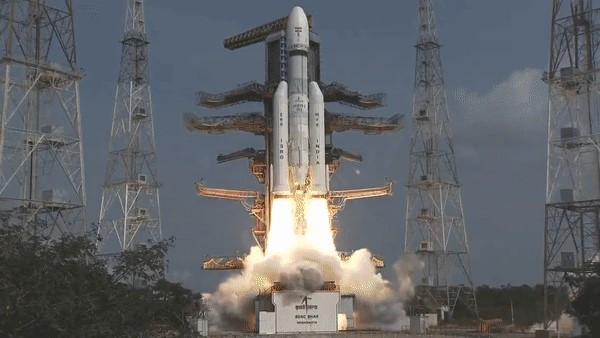Has the Indian space agency ISRO increased the carrying capacity of its LVM3 rocket by one ton to five tons? If yes, when that happened is the question that pops up on seeing an announcement by its commercial arm NewSpace India Ltd (NSIL).
NSIL, is taking a five year demand survey for three of the four rockets developed by Indian Space Research Organisation (ISRO).
The company has listed out ISRO’s three rockets viz Polar Satellite Launch Vehicle (PSLV-1,700+kg to 500 km orbit), Small Satellite Launch Vehicle (SSLV-500 kg to 500 km orbit) and LVM3 (formerly Geosynchronous Satellite Launch Vehicle Mk III- 5,000 kg to GTO) for assessing the launch services demand to orbit different classes of satellites.
Interestingly, NSIL has omitted to list ISRO’s Geosynchronous Satellite Launch Vehicle (GSLV-formerly GSLV Mk II) for the demand assessment even though it had published the rocket’s image on the document!
Perhaps, GSLV Mk II has been omitted as NSIL is not seeking out the private sector to make it unlike the other three rockets. Be that as it may, while listing out the features of LVM3, NSIL has said its carrying capacity to geo transfer orbit (GTO) is 5,000 kg or 5 tons. The rated capacity of LVM3 is 4 tons to GTO. It recently orbited GSAT-7R satellite weighing 4.4 tons to GTO by tweaking the orbit.
Instead of the conventional 36,000 km apogee, the GTO apogee for GSAT-7R was set at about 29,970 km (±3,700 km). Former ISRO Chairman Dr. S. Somanath explained that the satellite would use its own propulsion system to reach the final Geostationary Orbit (GSO), a more efficient approach overall. But using satellite’s onboard fuel will reduce its lifespan.
It is learnt that NSIL has specified the LVM3’s payload capacity as 5 ton as ISRO will soon be fitting the rocket with a high powered cryogenic engine that will carry more fuel and provide higher thrust. Further, the rocket’s second stage liquid fuel engine will be converted to a semi-cryogenic engine.
Both the changes will increase the LVM3’s payload capacity and will be ready for NSIL to offer the rocket for launch.
According to NSIL, since the rocket launches are demand driven and it is in the process of getting the rocket’s manufactured by the industries it is now seeking a requisition form to be filled to understand satellite launch market till 2030.
The company said it offers standard satellite dispensers and if needed customised adapters could be designed for the launch. NSIL will provide the satellite fuel, fuel support and fueling cart and tracking service. NSIL also said it will offer support in completing the customs formalities at the Chennai Airport and transport the satellite to the rocket port in Sriharikota about 100 km from the airport.
It is also learnt that NSIL will be more focused on the proactive marketing of its service to potential clients in the coming times.

![]() Published by Venkatachari Jagannathan
Published by Venkatachari Jagannathan
V.Jagannathan (Byline Venkatachari Jagannathan), is a freelance journalist based in Chennai, India covering the country’s space, nuclear, insurance, automobile and several other industries. Jagannathan was with IANS newswire, one of India’s premier news agencies and his articles – news, news analysis, interviews, profiles and others- on various sectors were published in several leading print, online publications within and outside India. He was also with India’s first online business magazine www.domain-b.com. A school and college chess player Jagannathan also writes about Indian chess and has covered World Chess Championships, Chess Olympiads and others.
